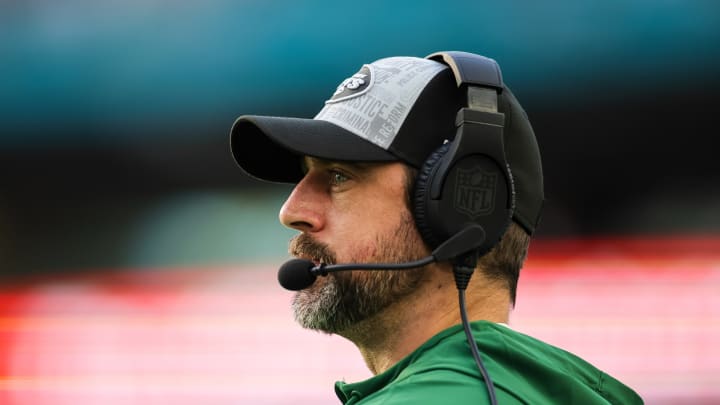Can Aaron Rodgers Return to MVP Form in 2024?

Former Cal quarterback Aaron Rodgers said Tuesday he won't return this season but will play next season.
That, of course, raises the question: Can a 40-year-old quarterback who missed virtually an entre season with a torn Achilles tendon be nearly as effective as he was in 2021, when he won his fourth MVP award.
Tom Brady had considerable success after the age of 40, but he was not coming off a serious injury.
Rodgers said on the "The Pat McAfee Show" on Tuesday that he will not return to action this season with the New York Jets eliminated from playoff possibilities.
That was expected.
However, Rodgers, who turned 40 earlier this month, said he plans to play in 2024 and beyond for the Jets. But will he be productive? Could he lead the be Jets to the playoffs? Or will he be unable to recapture the skills that have made him a certain Hall of Fame inductee?
Rodgers suffered the torn Achilles tendon in the 2023 opener and had surgery September 13. But he seemed determined to return much sooner than athletes typically do from that injury, even suggesting several times in the past few weeks that he might be able to return this season.
He said Tuesday a return to play this season in a playoff game would have been "an absolute no-brainer." But with the Jets (5-9) eliminated from playoff contention on Sunday, he said he will not be back this season since he is not 100% healthy.
"If I was 100 percent today, I'd be definitely pushing to play," he said. "But the fact is, I'm not."
He added that if he were medically cleared, he would have been willing to accept the risks and play in the postseason, even if he was not 100 % healthy.
Rodgers' 21-day practice window closes Wednesday. If the Jets don't activate him, it means Rodgers will remain on injured reserve for the final three weeks. That is what is expected to happen now unless Rodgers would request to be activated so he could continue practicing. That would require the Jets to remove someone from its 53-player roster to make room for Rodgers, and that seems unlikely.
Presumably Rodgers will be as close to 100% as he can get by the start of next season, and some NFL quarterbacks who played into their 40s continued to have success.
The one prime example is Tom Brady, who was named MVP at the age 40, was named to Pro Bowls at the ages of 40, 41 and 44 and won a Super Bowl at the age of 43. He had a regular-season record of 68-30 as a starting quarterback at ages 40 and older. He sustained a season-ending torn ACL injury in the 2008 opener, and had his best seasons after that, including a Pro Bowl season in 2009. But he was just 31 years old in 2008.
Rodgers will be trying to come back from a serious injury at an age when most quarterbacks are retiring.
Brett Favre turned 40 midway through the 2009 season, and he had a 13-5 record with the Vikings that season, and that included a postseason win. But he was just 5-8 the next year before retiring.
Drew Brees went 18-9 in his his final two seasons at age 40 and 41, and won one playoff game at age 40. But he missed considerable time with injuries both seasons, and his inability to throw deep passes significantly limited the Saints in his final season.
Warren Moon had a 15-18 record in his five seasons at age 40 or older. Len Dawson was 1-4 in his one season at age 40, Sonny Jurgensen went 3-1 at age 40, and Jonny Unitas had a 1-3 record in his final season at age 40.
Coming back from a torn Achilles tendon adds a critical variable. Athletes typically don't return to peak performance until the second year after coming back from that injury.
We'll see.
Cover photo of Aaron Rodgers by Sam Navarro, USA TODAY Sports
Follow Cal Sports Report on Twitter: @jakecurtis53
Find Cal Sports Report on Facebook by going to https://www.facebook.com/si.calsportsreport
.
